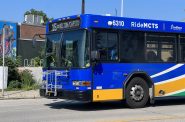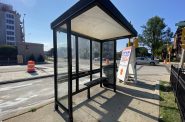County Changes Electric Bus Policy
Board will pause purchase of electric buses and buy hybrid buses instead.
![Electric bus. Photo by Ryanmirjanic [CC BY-SA 4.0 (https://creativecommons.org/licenses/by-sa/4.0)].](https://urbanmilwaukee.com/wp-content/uploads/2019/05/1024px-Electric_Bus.jpg)
Electric bus. Photo by Ryanmirjanic (CC BY-SA 4.0).
Under a resolution sponsored by Sup. Jason Haas, and adopted by the board, the county will pause all purchases of battery electric buses (BEBs) not already in motion and instead pursue diesel hybrid-electric buses for future bus replacements.
The county first got involved in Battery Electric Buses in fall 2018, when then-board Chairman Theodore Lipscomb, Sr. introduced an amendment to the 2019 budget that made it the county’s policy to begin transitioning Milwaukee County Transit System’s (MCTS) bus fleet to all electric.
Lipscomb’s goal was to push the county to begin transitioning away from fossil-fuels for public transit service. And Haas’s legislation is, at a slower pace, in line with that policy created two years ago.
Haas’s resolution states that the county “remains committed to the eventual electrification of its bus fleet to mitigate fossil fuel emissions.” What it does is pause any future purchases of BEB’s until the county studies the performance of the initial 15 buses.
BEBs are more expensive than regular diesel buses both to purchase and maintain. They will require significant capital investments in new charging stations and maintenance facilities for MCTS. Any savings the county found on fuel costs would be offset by increased capital and maintenance costs. However, the point of fleet electrification is not to save money, but to reduce the use of fossil fuels and move the county closer to meeting its emissions goals.
The technology for BEB raises some concerns, as well. In Indianapolis, the transit agency IndyGo started operating their own BRT lines with electric buses and had goals for full fleet electrification by 2035, the Indianapolis Star reported. But when temperatures drop below 50 degrees, the buses are unable to hold a charge and cannot complete their routes, reported local news station WRTV. At times the buses are pulled out of service and replaced mid-route because their batteries are running so low.
In February, IndyGo canceled an order of electric buses and bought a new batch of diesel buses because of all the trouble they’ve had on their BRT lines.
When Haas’s resolution went before the Finance Committee this month, he said “electric bus technology, which is still very much in development and improving over time, still has a number of limitations that really may hinder us here in Milwaukee County.”
In the budget amendment that set the original electric bus policy for the county two years ago, Lipscomb wrote that the Milwaukee County Department of Transportation “may also seek bids for diesel-hybrid buses as a transitional technology.”
Hybrid buses won’t require the large capital investments in extensive changes to bus depots and maintenance facilities that would be required by electric buses. They can more seamlessly be integrated in the existing transit system.
Haas’s resolution puts the brakes on further BEB purchases and instead leans into the “transitional technology” before the county starts getting the ball rolling on budgeting and bonding for the hundreds of millions of dollars that full fleet electrification will require.
If you think stories like this are important, become a member of Urban Milwaukee and help support real, independent journalism. Plus you get some cool added benefits.
Transportation
-
MCTS Adds 28 New Buses
 Jul 13th, 2024 by Graham Kilmer
Jul 13th, 2024 by Graham Kilmer
-
MCTS Designing New Bus Shelters
 Jul 10th, 2024 by Graham Kilmer
Jul 10th, 2024 by Graham Kilmer
-
MCTS Updates RNC Bus Detours To Better Serve Downtown, Riders
 Jul 9th, 2024 by Jeramey Jannene
Jul 9th, 2024 by Jeramey Jannene






















I’d like to note that an all-electric public transit system has been operating in Milwaukee County’s most populous municipality for several years now. The vehicles have demonstrated an ability to operate not just below 0 F, but also during the polar vortex when the air temperature reached -20 F with windchill to -40 F.
These emissions-free vehicles have accessibility through large doors, ADA-compliant level-loading, rapid loading, smooth ride, predictable-path travel, excellent ventilation through the large doors, hybrid battery and overhead-wire energy system, ability to connect walksheds centered at stations, energy-efficient and low-resistance rail operation (24 times more efficient than rubber-tired vehicles), ability to capture the attention of residents and visitors, strength in supporting transit-oriented development including affordable housing, record of safety, permanence as infrastructure, and the ability to alleviate the need for automobile storage at destinations. These qualities can contribute to place-making and city-building. Moreover, these qualities are non-existent or weak in current bus-based transit systems. These vehicles build value through transportation that is efficient, scalable, durable, community-building, and preferred by riders.